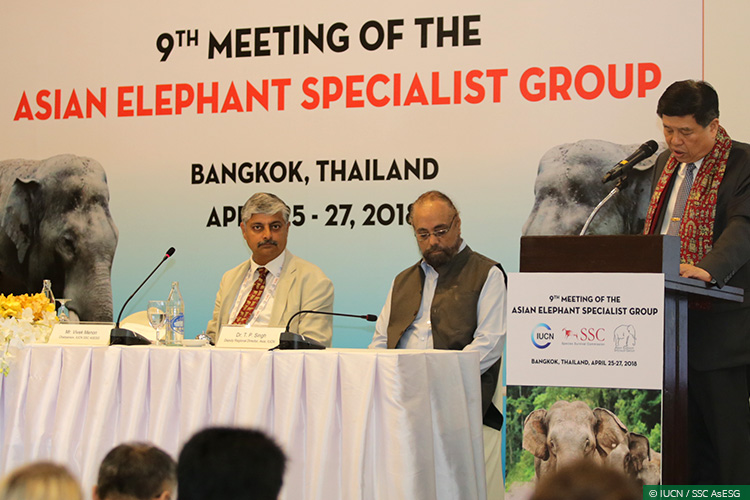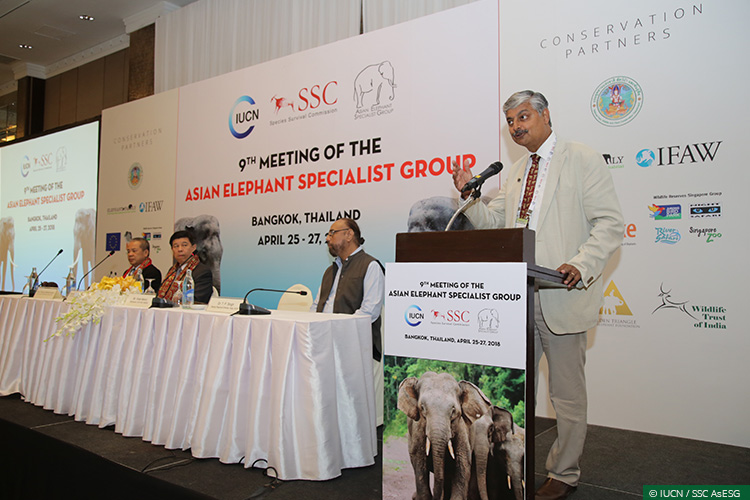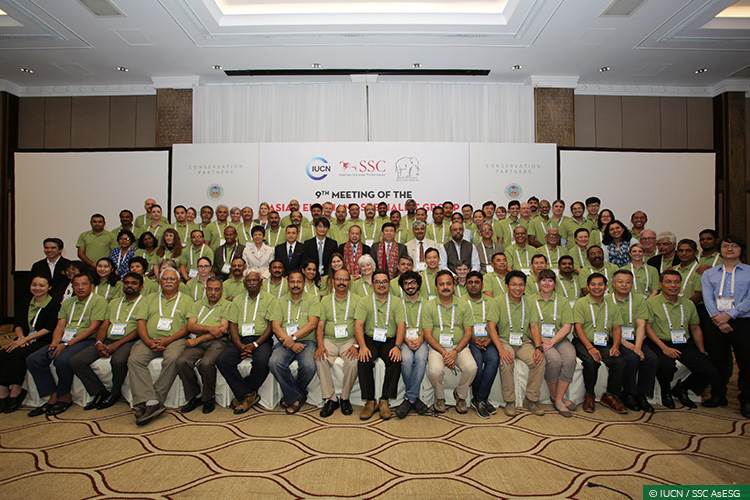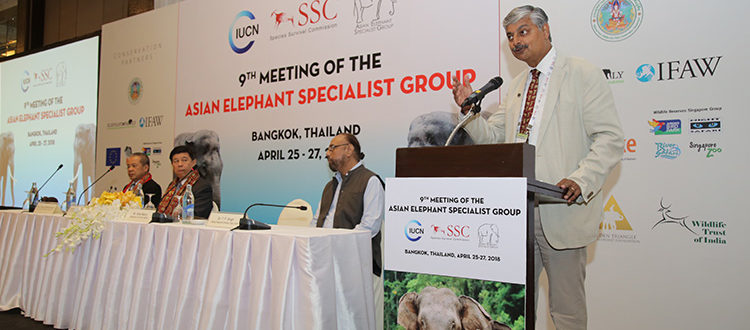9th Meeting of Asian Elephant Specialist Group Members Held in Bangkok
Over 100 of the world’s foremost experts on Asian elephants attended the meeting; current status of wild and captive elephants, mitigation measures for human-elephant conflict, illegal trade in elephants and elephant parts discussed
 General Surasak Karnjanarat, Hon’ble Minister of Natural Resources and Environment, Kingdom of Thailand, addressing the delegates
General Surasak Karnjanarat, Hon’ble Minister of Natural Resources and Environment, Kingdom of Thailand, addressing the delegates
Bangkok, Thailand, April 28, 2018: The 9th Meeting of the Asian Elephant Specialist Group (AsESG), the IUCN (International Union for Conservation of Nature) Species Survival Commission’s dedicated body for the study, monitoring, management and conservation of Asian elephants, was held at the Avani Riverside Hotel in Bangkok, Thailand from April 25 to 27.
Discussions on priorities and strategies for Asian elephant (Elephas maximus) conservation took centrestage during the three-day meeting, which was attended by about 120 people including AsESG members, government officials from the 13 Asian elephant range countries, and presenters and observers from ‘non-elephant’ countries like the United Kingdom and United States of America.
“This meeting provides a good opportunity for experts on Asian Elephants to look at various aspects of wild and captive populations and provide technical support to governments and others on the long-term conservation of the species”, said General Surasak Karnjanarat, the Hon’ble Minister of Natural Resources and Environment, Kingdom of Thailand, while addressing the delegates at the inaugural session on April 25. He also declared that Thailand had developed the Twenty Year National Master Plan for the Conservation of Elephants, to address best practices for the sustainable conservation of wild and captive elephants.
 AsESG Chair and Wildlife Trust of India’s Executive Director & CEO addressing the delegates
AsESG Chair and Wildlife Trust of India’s Executive Director & CEO addressing the delegates
Welcoming the delegates, Dr T.P. Singh, Deputy Regional Director of IUCN Asia, said that the uniqueness and value of the IUCN Species Survival Commission and its Specialist Groups like the AsESG embodies the spirit of IUCN’s ‘One Programme Approach’. Through this approach, he affirmed, the IUCN would continue to play its convening role and bring together governments, civil society, research organisations, universities and other stakeholders to work together to address emerging transboundary conservation challenges in the long-term conservation and management of Asian elephants.
Classified as ‘Endangered’ on the IUCN Red List (based on the AsESG’s assessments), the Asian elephant faces a multitude of threats including habitat loss (degradation and fragmentation) and poaching. Once found all over Asia, the species is now restricted to India, Nepal, Bhutan, Bangladesh, Sri Lanka, Myanmar, Thailand, Laos, Cambodia, Vietnam, China, Malaysia and Indonesia. Populations in the wild have fallen to less than 50,000 over the last century, with more than half the global population resident in India.
“As a keystone species the Asian elephant holds aloft so much of the rich biodiversity of our range nations. Allowing its populations to decline is like taking an axe to our collective natural heritage”, said Mr Vivek Menon, Chair of the AsESG and Executive Director & CEO, Wildlife Trust of India. “It is wonderful to see such an assemblage of skill and passion at this meeting of AsESG members”, he said. “As scientists and experts we must help formulate solutions to the complex issues that confront Asian elephant conservation today, ensuring the survival of the species for generations to come.” Mr Menon also appreciated the support of Elephant Family, the International Fund for Animal welfare (IFAW), the Kingdom of Thailand’s Department of National Parks, Wildlife and Plant Conservation, and other conservation partners in organising the meeting.
Status reports on Asian elephants in the wild and in captivity, as well as discussions on the framing of National Elephant Action Plans took primacy on the meeting’s agenda. The technical sessions included presentations from each of the 13 Asian elephant range countries present, as well as focussed discussions on important subjects such as mitigation of human-elephant conflict, the welfare and use of elephants in tourism, mapping the distribution of elephants in range nations, managing specific zoonotic diseases in captive and wild populations, and guidelines on the rehabilitation of captive elephants as potential restocking options in areas with extinct/almost extinct populations. The illegal trade in elephants and elephant parts was also discussed, as was the possibility of developing a CITES DNA Database of Asian elephants, and influencing international transportation policy in favour of more wildlife-friendly roads.
“The elephant is the national animal, the heart and soul of Thailand”, said Dr Pinsak Suraswadi, Deputy Director General of the Kingdom of Thailand’s Department of National Parks, Wildlife and Plant Conservation. “I believe that this meeting has been a platform not only for discussing the action taken, and identifying the priorities as well as the challenges in tackling Asian elephant conservation issues, but has also strengthened our collaboration to protect the Asian elephant in the future.”










